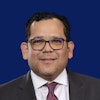Published
June 11, 2025
Artificial Intelligence (AI) is revolutionizing healthcare on a global scale, offering solutions to some of the world’s most pressing health challenges. In both the public and private sectors, AI is poised to significantly improve patient and public health outcomes worldwide.
Global AI policies and initiatives such as the EU AI Act, the G7 Hiroshima Process, and the recent AI Action Summit in Paris all aim to harness AI’s potential while ensuring ethical standards and robust governance. These efforts are not just about regulation—they are about enabling responsible AI deployment in critical sectors.
One such sector is healthcare, where AI’s evolving capabilities are poised to bridge gaps in access to care and improve the quality and efficiency of medical services worldwide. This forward-looking approach is essential for creating a regulatory environment for healthcare AI that can adapt to the rapid pace of innovative lifesaving technologies. Regulatory frameworks for AI must be flexible and sector-specific; otherwise, regulations may thwart innovation.
The healthcare sector is already highly regulated, and policymakers must engage with the industry to ensure AI rules reflect real-world use cases such as streamlining clinical trials, creating operational efficiencies, and enhancing diagnostic accuracy.
How is AI Improving Healthcare?
Enhanced Diagnostics: Healthcare workers can leverage AI algorithms that analyze medical imagery, including CT and retinal scans, chest X-rays, and mammograms, to better identify patterns and predict outcomes with remarkable accuracy. Researchers in the United Kingdom and Saudi Arabia found that AI-powered diagnostic tools were able to classify heart disease with 93% accuracy. This capability is particularly beneficial in diagnosing diseases at early stages, where timely intervention can significantly improve prognosis.
Personalized Treatment Plans: AI and machine learning can predict disease prognosis and therapeutic responsiveness to tailor treatment plans specific to individual needs, considering the individual’s unique genetic, environmental, and lifestyle factors. This personalized approach ensures that more effective, targeted therapies can be offered at a lower cost through accelerated drug discovery and optimized clinical trials.
Operational Efficiency: As the world is facing a looming healthcare workforce shortage, AI-powered systems can streamline administrative tasks, like scheduling, billing, and patient management, allowing healthcare providers to focus on delivering patient care.
Driving Innovation and Safety
With these advancements in healthcare come regulatory challenges that must be addressed to ensure the safe, ethical deployment of AI technologies. Regulatory frameworks provide guidelines and standards that help mitigate risks associated with AI, such as biases, data privacy concerns, and the potential for unintended consequences.
International organizations, including the G7, G20, WTO, and OECD, are actively shaping the global AI agenda through their own global governance frameworks. For instance, the OECD AI Principles offer a foundational framework for guiding the development and governance of AI technologies. These principles recognize the necessity of a stable policy environment fostering innovation and trust in AI.
To drive innovation while ensuring safety, policymakers must work with industry to ensure that AI technologies are developed and deployed responsibly. Flexible governance frameworks adaptive to the rapid pace of AI development must be prioritized based on input from industry, academia, and civil society to continuously improve AI regulations. The healthcare sector, in particular, involves unique considerations such as patient safety, privacy, and the critical nature of medical decisions.
“As AI technology advances, the regulatory frameworks that govern its use must be equally dynamic and responsive. There is a need for continued dialogue and collaboration among stakeholders to future-proof AI regulation,” says Diana Pankevich, Ph.D. Global Innovation Policy Lead at Pfizer Inc.
The Chamber advocates for tailoring AI regulations to the unique needs and risks of each sector—be it healthcare, finance, or transportation—rather than applying a one-size-fits-all approach. For instance, AI used in diagnostics may have different risk profiles and regulatory needs compared to AI used in administrative processes within hospitals and healthcare systems. This position aligns with the Chamber’s broader emphasis on flexible, innovation-friendly governance.
By following these guidelines, AI policies can foster innovative healthcare solutions while protecting patient rights and upholding ethical standards, including transparent, unbiased AI systems. This dual focus is essential for building trust and maximizing the benefits of AI in healthcare. By engaging stakeholders, including healthcare providers, patients, and AI developers, policymakers can create a balanced ecosystem supporting the responsible integration of AI in healthcare, enhancing patient outcomes, and driving growth.
The Bottom Line
Globally, AI technology is revolutionizing healthcare by enhancing diagnostic accuracy, personalizing treatment plans, and streamlining administrative tasks. Its potential to improve patient outcomes, reduce costs, and make healthcare more accessible and efficient is massive.
By embracing AI, we can create health systems that are not only more efficient but also more responsive to the needs of every patient. Balancing safety with agile, industry-specific policies will drive continuous improvement and AI innovation, ensuring that AI can evolve while maintaining high standards of safety.









